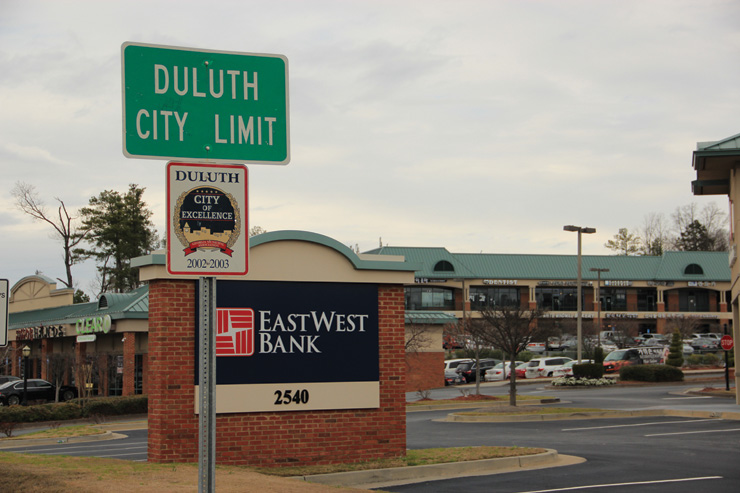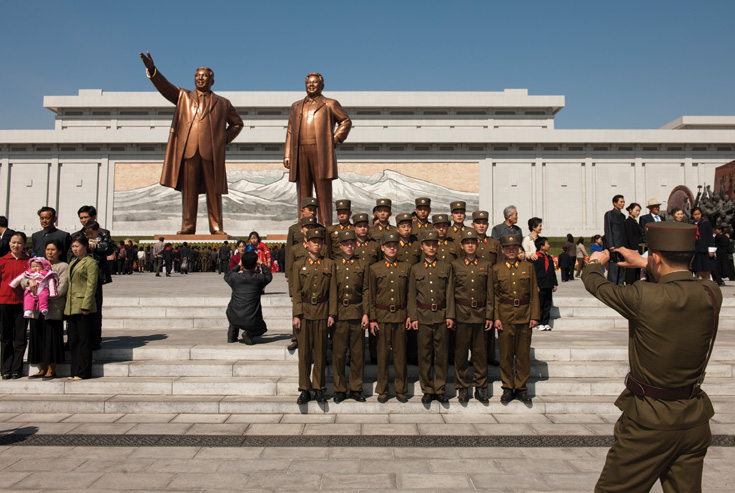Photo by Christina Lee
Our Town
Responding to a huge spike in the Korean population in Duluth, Ga., city officials and community volunteers formed the Korean Task Force to help overcome cultural and language barriers between the local government and its Korean citizens. The group’s biggest task yet: to gain notice from Koreans themselves.
by CHRISTINA LEE
On a Sunday afternoon in March, a Super H Mart in Duluth, Ga., was starting to fill up, though not with customers. By 12:30 p.m., employees had set up five sample stations offering such items as barley noodles and “angus beef with bulgogi sauce.” Less than an hour later, five more sample stations popped up. “It’s so slow,” said one employee, who was serving Vermont Curry. “Yesterday was so busy.” But she had spoken too soon. Just minutes later, most of the Park Village Shopping Center’s vast parking lot had filled up.
Less than 10 years ago, most of Park Village’s suites were vacant. Now, however, it is a bustling, one-stop retail destination of more than 50 Korean businesses, from restaurants to hair salons to dental offices—and the main reason some residents wonder whether Duluth, about 25 miles northeast of Atlanta, is becoming Georgia’s Koreatown.
“Pleasant Hill Road, from there to [Interstate] 85 and across I-85, is probably the most dynamic retail business area in the state of Georgia for Korean-owned businesses,” declared Christopher McGahee, Duluth’s economic development manager, in an Atlanta Radio Korea interview.
The shopping center’s rapid development signals the growing presence of Korean Americans in this small town of 26,600 residents, and their contributions toward a dynamic retail hub. But such a dramatic change also comes with its share of challenges. Suddenly, emergency responders have had to navigate areas with hangeul only signage. In recent years, a disproportionate number of Koreanrestaurants were shut down due to alcohol violations that were more the result of cultural differences versus a blatant disregard for the law.
U.S. city governments often make the mistake of ignoring their minority business centers, even when deciding on policies that directly affect them, only to have these constituents cry out in protest when they find out they are being mandated to post bilingual signage on storefronts, for example. However, Duluth has taken a different approach. This town has the Korean Task Force standing by—a proactive group that seeks to involve the newcomer community in the solutions.
Now, if only more residents actually knew what it was.
***
The most recent census figures show Duluth’s overall Asian population at about 23 percent, and between 2000 and 2010, there was an 82 percent growth in the Asian American and Pacific Islander population in Georgia. Korean Americans account for a large portion of that growth. In fact, there is a running joke among Duluth’s Korean residents: “If you got your house in L.A. and you sell your businessin L.A., you can come to Atlanta and buy a house and two businesses,” said Judy Yi, program director of the nonprofit Center for Pan Asian Community Services. She actually lives in Duluth, not Atlanta.
“What we’ve been seeing here is that there’s a lot of migration [of Koreans] from the bigger cities, like L.A., New York or Chicago,” said Yi. “Those who are comfortably business owners, they come down to the South because the cost of living is so much cheaper.”
More than a quarter of Georgia’s Korean residents have settled in Gwinnett County, which encompasses Duluth and neighboring suburbs like Norcross and Suwanee. That presence has indeed been felt, and the community has responded. You see, in recent years, local hospitals hiring Korean-speaking staff and offering comforts like juk (rice porridge) and Korean-language newspapers to their Korean patients. You see law enforcement now enlisting volunteer translators and hiring two Korean-speaking officers among the Duluth Police Department’s 43 uniformed officers.
In the same spirit and responding to this major demographic shift, the Korean Task Force formed three years ago, after newly elected Mayor Nancy Harris noticed a sudden spike in Duluth’s alcohol license revocations, particularly among Korean merchants. It raised a red flag for her, a former principal of Suwanee Elementary, where she recalled a problem with the lack of participation by the parents of Chinese and Korean students in parent-teacher conferences. Back then, she and her staff formed an Asian Task Force, working with a local church to learn best practices for communicating with Asian families. They would learn that the best time to get these families to the school was Sunday afternoons, after church, so they began holding meetings on Sundays, with better results.

“Being an educator and coming from a school, I started thinking, ‘Well, if there’s a problem, it’s got to be a lack of education.’” Harris said.
She was right.
Members of the Korean Task Force would find that the most common citation in the alcohol violation cases involving Korean business owners was serving soju by the bottle, then leaving it on the table for patrons to serve themselves. Such is a traditional gesture in Korean culture, but with soju classified as liquor in Georgia, it’s also one that’s prohibited.
Proprietors are allowed to pour the alcohol into a pitcher and serve that at the table, but they cannot hand the table an entire bottle, according to city officials. In response, the task force recommended that the city mandate alcohol vendor and handling training for its merchants, the first of its kind in Gwinnett County, and also the first to be offered in Korean and English. (Incidentally, staff from Yi’s organization, Center for Pan Asian Community Services,translated the materials for the training.) Officials saw results pretty quickly, with an overall drop in alcohol revocations by the following year.
The task force is headed up by city officials like the mayor, city council members and Duluth’s first-ever Korean American associate judge, Chung H. Lee, as well as community volunteers like Clayton Lee, chief financial officer of an investment group, and Jenny Wesselmann, a local real estate broker. Aside from the City Hall faces, Clayton Lee and Wesselmann, both Korean American, have emerged as the two most recognizable members of the task force.
When they found out that emergency responders were often struggling to locate Korean businesses in the area because their signs were not posted in English, Wesselmann and Lee, who speak Korean fluently, got to work immediately. They accompanied the mayor and other city officials in door-to-door visits to all of the city’s Korean establishments. The task force asked the business owners to request bigger suite numbers and, if they could afford it, purchase additional English signage for their storefronts to help increase their visibility for emergency responders. (Duluth still does not require bilingual signage by law, though as clearly seen around the city, the majority of Korean businesses have installed English signage, too.)
“We are coming in as city officials, but we are coming in to help the business owners,” said task force member Clayton Lee. “When we speak the same language, it lends to better understanding. Instead of giving them a letter, like we’re demanding or ordering something, we make them understand first.”
This proactive approach is gaining recognition.
 Less than 10 years ago, most of the suites in this Park Village shopping plaza in Duluth, Ga., were vacant. Today, it is a bustling, one-stop retail destination of more than 50 Korean businesses. Photo by Daniel Han
Less than 10 years ago, most of the suites in this Park Village shopping plaza in Duluth, Ga., were vacant. Today, it is a bustling, one-stop retail destination of more than 50 Korean businesses. Photo by Daniel Han
In February, the Georgia Municipal Association and Georgia Trend magazine released its annual list of “Trendsetter Cities,” and included Duluth, citing the formation of the Korean Task Force. Other officials, including from Lake City, Ga., also began contacting Harris, asking how to implement similar task forces in their cities that were experiencing demographic shifts of their own. “I think our biggest accomplishment has just been the little bit of notoriety,” Harris said. “Other cities are seeing that Duluth has reached out to a predominant culture, and we’re working together to make our community better.”
However, the notoriety does not necessarily mean the community that the task force is targeting necessarily buys into it, or is even aware of its existence. When asked whether they had heard of the task force, several Park Village merchants shook their heads. Eric Yu, owner of Shilla Jewelry in Park Village, said that he’d like to see the Korean Task Force notify business owners of regulation changes, though as he kept adding, “I don’t know if the Korean Task Force does that kind of thing.”
Task force members want Korean American proprietors and residents to join the group, though Clayton Lee admits that it’s been difficult to grow the membership. He attests that he has personally received emails and phone calls from Korean business owners who express gratitude for efforts like the alcohol handling training offered in the Korean language. However, when it comes to recruiting new members, “they think there’s qualifications to become a [member of the] Korean Task Force,” he said. He referenced one business owner, a Suwanee resident, who joined, but soon lost interest. “It is all voluntary work, and you have to put your time and effort without getting any awards, immediate rewards,” said Lee.
The task force has always opened its general meetings to the public, though this year the group is hosting them at Korean establishments in order to draw more people. This past January, the group hosted a general meeting at Do Re Mi Karaoke in Park Village that 25 people attended, according to Mayor Harris, noting that is a significantly higher turnout than in the past.
The Korean Task Force members reiterate the group is standing by. “We don’t know what each individual Korean business owner needs or desires from the city, how the city can help them and their business,” said Chung Lee. “The only way to address that is for them to come to us and ask us, and we are opening that door for them to come on in.”
One senses Lee wants to do more than just open the door, however. At the task force’s recent steering committee meeting, the agenda’s last line of new business read, “Kevin Kim—we need to be on his show—see quote.” The quote referenced was Kim, general manager and talk show host of Atlanta Radio Korea, telling the Atlanta Journal-Constitution, “I don’t think the task force has much influence yet.”
Lee emphasized to his colleagues how avidly Korean residents follow local news outlets like Atlanta Radio Korea and the Korea Daily. He suggested the task force should reach out to the Korean media—invite Kim to a meeting, perhaps. He peered down, perhaps at the agenda in front of him, and, raising his voice slightly, said, “We’re not sitting here for two hours twiddling our thumbs.”
This article was published in the June 2012 issue of KoreAm. Subscribe today!











